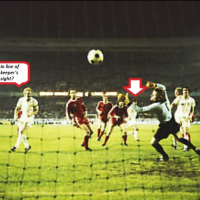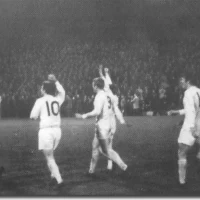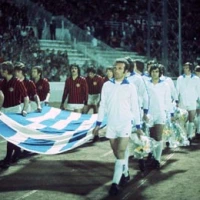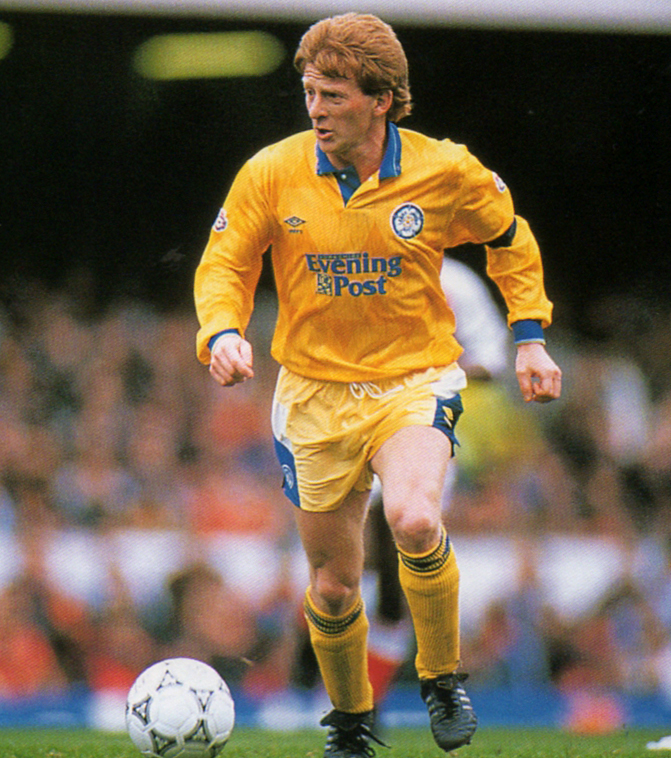As a Leeds United fan, the twenty year period between the start of the Premier League era and the departure from Man U of Alex Ferguson was for me a two-decades long spell of misery and disillusionment, relieved only by occasional peaks when some other team got a chance at the game’s major honours.
Man U monopolised the action to an extent unprecedented in modern history; to an extent, what’s more, unheralded even by their own respectable record prior to 1993. It was as if, with the inception of the Murdoch-backed elite top flight, a switch had been thrown to activate a Man U winning machine and reduce all rivals to the status of also-rans.
It was a modern phenomenon – but, as it now turns out, it was all a myth, all smoke and mirrors. This was aptly summed up by the present-day Man U struggling, with most of the same personnel and all the same financial advantages, against League Two basement boys Cambridge United. This was the reality masked by that twenty year bubble. Man U are relatively ordinary – the Taggart years were a myth. What we were watching over those two decades was nothing more than an over-long retelling of “The Emperor’s New Clothes” – and we’re now some way past the part where the clear-sighted little boy has blown the gaff.
Thousands upon thousands of pissed-off football fans could tell you their own tale of a refereeing injustice sustained by their team, to the benefit of Man U. I have a variety of my own where Leeds United have been denied – a penalty given two yards outside the area at the Gelderd End, the disallowing of a Wes Brown own goal (for offside!), the failure to dismiss Man U keeper Fabien Barthez after he had conceded a penalty so crudely that it had had to be given – only for him to remain ludicrously undismissed and poised in goal to save the spot kick when he should have been taking an early bath.
Many other clubs will have similar anecdotal evidence. Tottenham’s “goal” at the Theatre of Hollow Myths, two yards over the line but not given, Barnsley’s non-awarded penalty at the Beckford End when the foul was so blatant that even the commentators swore it should have been awarded. There are many, many more. It’s happened time and again, over the whole history of the Premier League. A notorious statistical study found that, over an extended period of time, 87% of all fifty-fifty decisions went the way of the Pride of Devon. In a game of fine margins, as any top-level professional sport is, that is a deeply damning statistic – and it makes a vital difference.
Over this whole period, naturally, official reassurances and denials of the obvious were as bland and unctuous as they were patronising and insulting to the intelligence of fans everywhere. The media were complaisant in this, and the commercially-driven circus travelled on. At any slight sign of rebellion or disagreement with the party line, Ferguson himself would make a choleric proclamation; damning whichever referee had failed to decide in his team’s favour, or pouring Govan bile over whichever media organisation had dared think the unthinkable, or presumed to print heresy. One of the most familiar of radio sports headlines was “The FA have confirmed that Alex Ferguson will face no further action over [insert blatant transgression of rules here]”. It was tiresome, it was depressing – but it was the norm and, over time, a weary acceptance crept in that this is how our game now was.
Sooner or later, though, there was bound to be someone intimately involved with all of this, who would finally break ranks and confirm what we always knew: namely that two decades of unprecedented success have been founded upon bullying and intimidation to influence the game’s authorities both on and off the field, and to ensure a smooth passage in the print and broadcast media. Then, finally, ex-referee Graham Poll came out in print and admitted how it was to be officiating in that era when Fergie’s word was law and referees (together with their support officials and governing body) were under immense pressure to rule on matters in a manner favourable to Man U.
“All the refs wanted in a Man U game,” said Poll, “was to get the match over, without having made any controversial decisions against Fergie’s boys – and ideally with Man U having won.”
Damning stuff, straight from the horse’s mouth. Again, we’re back to those fine margins. At the top level of any sport, it doesn’t take much to destroy the balance upon which depends true competition to ensure a reasonably level playing field. It turns out that the playing field was as skewed as Yeovil’s legendary sloping pitch of giant-killing memory. But at least at Yeovil, both teams got to play with the slope for half a game each. Poll’s evidence is that the slope was in favour of Man U for 90 minutes plus however many were needed to ensure the “right” result. Man U have won all those Fergie years honours with the aid of loaded dice. So much in control of the game were they, it redounds to their shame that they didn’t win absolutely everything, every year.
Don’t take it from me. Why would you? I’m a Leeds fan with my own instinctive dislike and contempt for that over-blown club, that media-inflated false legend built on a well-marketed tragedy. But just think back over all those incidents going back all those years. Look at the watershed of the Premier League being founded – how the game was suddenly all about commercial interests, flogging satellite dishes and replica shirts. Look where the biggest market was – all those plastic Man U fans in Devon and Cornwall, all of those merchandise-hungry fanatics who never saw a match day but shelled out for tacky Man U tat. Look at the record of the Man U club prior to 1993 – seven titles in all their history. And then 13 titles in twenty years after Murdoch bought the game and gift-wrapped it for Man U. That’s quite a before and after picture, isn’t it?
The insistent pressure was extended beyond its mere effect on referees, too. How many times have you seen Sky TV lingering lovingly over some Man U performance where the opposition simply caved in and rolled over to play dead? And they’d win, 7-0, 9-0 even. Because they weren’t a bad team, and over the course of those twenty years they may well have won four or five titles, even if the game hadn’t been bent out of shape in their favour. See, I can be realistic about these matters. But ask any sports psychologist about the drip, drip, drip effect of relentless media propaganda. How many times do you need to be told you have no chance, before you begin to believe it? Teams went there psyched-out, expecting to lose, knowing they’d never get a penalty and would more than likely concede one or two and maybe end up with ten men too. Sometimes, they would even rest important players for a game they had a chance of winning a week later. They’d naturally sink to a defeat they acknowledged as inevitable, and Man U’s title rivals could do nothing but grind their teeth. And so the whole basis on which league football is predicated was blown out of the water, all to the inevitable benefit of Man U. Fine margins and psychological edge – it doesn’t take much to warp the whole shooting match hopelessly out of shape.
What Graham Poll has done is to admit – in so many words – just what a relief it was to get off the pitch without having made any significant decision against a victorious Man U – because he knew what would follow as Ferguson would bitch about it in the press, and nobody would hold him to account. There are plenty of examples of referees making the “wrong” decision, leading to the “wrong” result – and then not being awarded another high-profile game involving the Pride of Devon for literally months. It was freely bandied about that this or that ref had been “banned” by Taggart. Meanwhile, the refs who “behaved themselves” – and we all know who they are – were regular fixtures at Old Trafford games, or in away matches featuring Man U. It was all so frightfully, disgustingly cosy.
Now Ferguson has gone, and Poll – possibly tongue-in-cheek – was “worried” this time last year for the tyrant’s successor David Moyes. He warned Moyes that he has “no chance” of pulling off the same kind of influence that he cheerfully and willingly admits Ferguson exerted over the game’s arbiters. Some may well have noticed attempts on the part of the pitifully inoffensive Moyes to act like some Fergie clone, blustering his way into some pallid imitation of the Beast of Govan. But really, it was to very little avail. And, inevitably, Moyes paid the price as Poll clearly foresaw. It just wasn’t the same for Man U without Ferguson to tyrannise the game, and still isn’t the same feeling under the almost equally baffled van Gaal, for whom the cracks are now starting to show in the shape of tetchiness and intolerance on camera. The Beast is gone – for the moment anyway – and with him has gone most of the edge of intimidation granted to Man U for so many years.
The thing is, this will come as news to not all that many people. Figures within the media will profess astonishment and cynicism, preferring to dismiss even such compelling testimony as a storm in a teacup. You still hear, week after week, commentators doing their best to sound surprised when another Man U foul goes unpunished, another good penalty shout goes un-awarded. In tones of wonderment, they will observe “Well, the ref seemed to have a good view of that, I can’t quite understand why he’s not given it…” Week after week, month after month, year after monotonous year. But the fans know – and the fans, other than those with a vested interest and an armchair in Milton Keynes, will be totally unsurprised over those admissions of Graham Poll. They will not be startled by what he has said – maybe just at the fact that he chose to say it. All of this has been so ‘nudge, nudge, wink, wink’ over the Premier League era. But the fans have known, alright.
It explains why, whenever a fan answers the question “who do you support” with “Man U” – and despite all those trophies, all that dominance – there is no gasp of respect, no acknowledgement of success. It’s much more likely that they’ll be laughed at, and there’s no greater tragedy than that for what was once a name respected throughout world football – even if they HAD gone 25 years without the Title. Ultimately, this will affect the way in which a famous club is regarded by history. Nobody needs to tell a Leeds United fan about that – and there are more reasons to damn this United from just outside Manchester than there ever were to damn our own beloved United of Leeds.
It’s not clear why Graham Poll chose to come out and confirm what so many of us have known for so long. Maybe it was a warning ahead of a possible return for Ferguson should even Louis van Gaal suffer Moyes’ fate and be cast adrift as the failures and defeats pile up. There is a precedent for this. Busby returned briefly when Wilf McGuinness, his hapless successor, found he’d inherited a poisoned chalice. But that was 40-odd years ago and there was no Premier League to warp the game out of shape for pecuniary considerations. And Ferguson, it goes without saying, is no Sir Matt – he is unfit to lick Busby’s shoes, never mind fill them. Our game is far better off without his malign presence and influence.
Could Graham Poll, resentful of the pressure he had to work under as a ref for Man U games, be trying to warn the current batch of officials not to go back to their cowardly old ways if Ferguson DID make a comeback? Could he belatedly be recognising where his duty to the game should actually be leading him? One thing’s for sure: it’s out in the open now – and it’s the job of everyone with the interests of football and fair competition at heart to make sure that’s exactly how it stays.

























